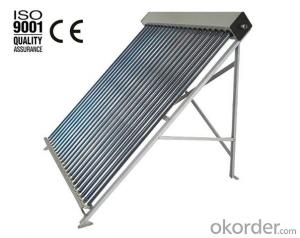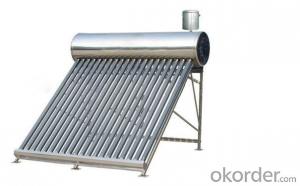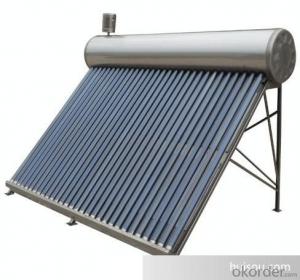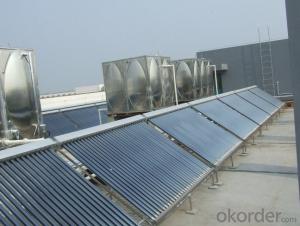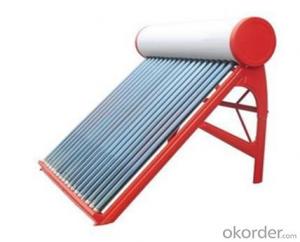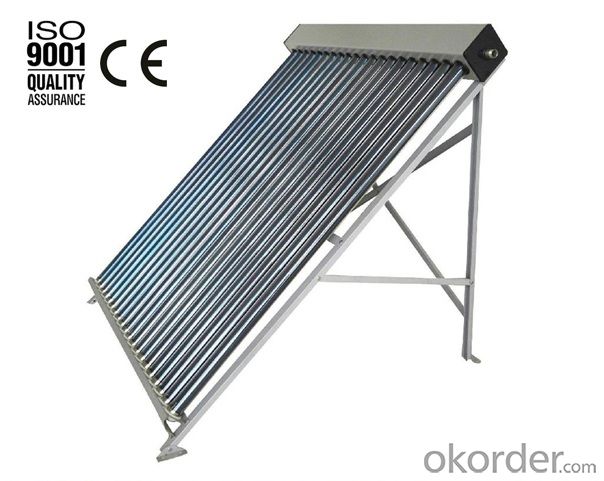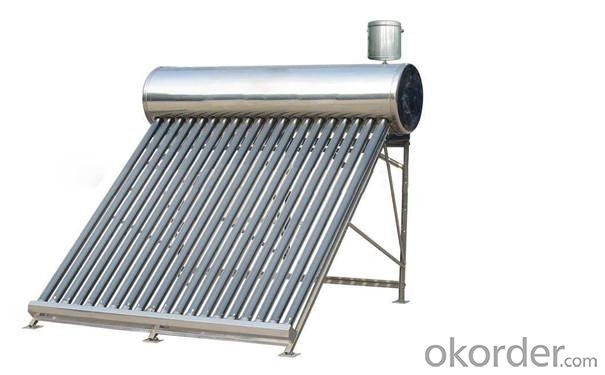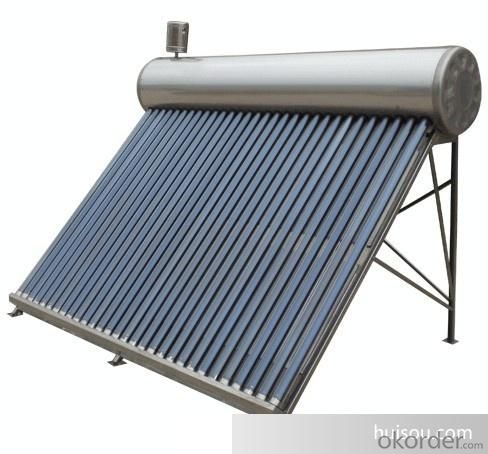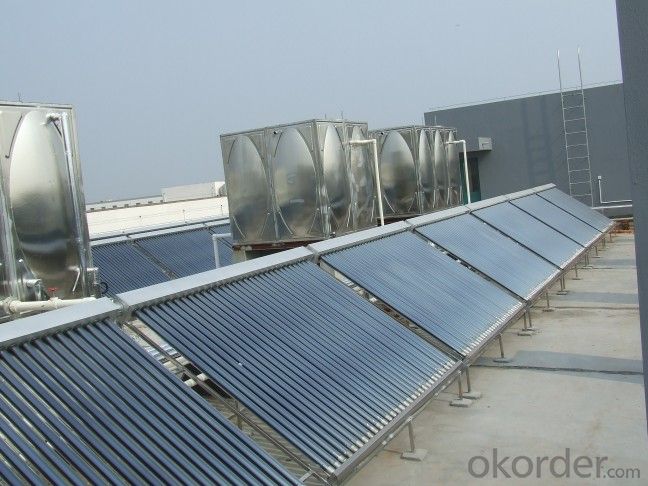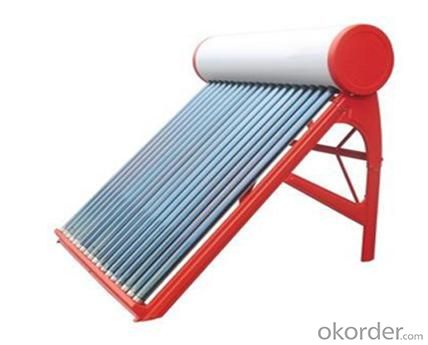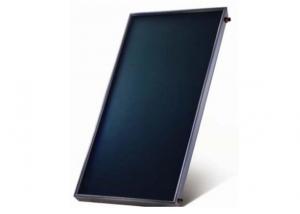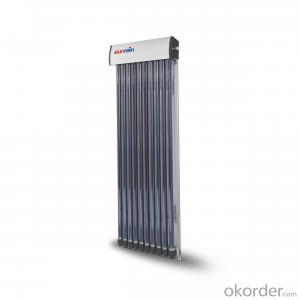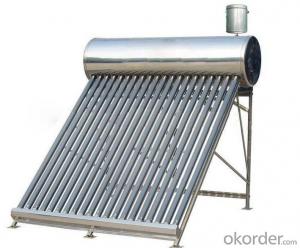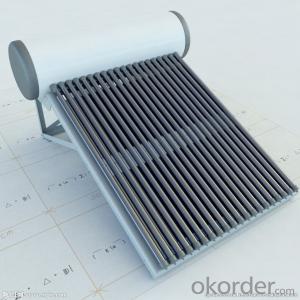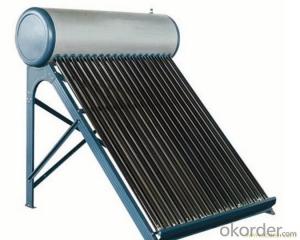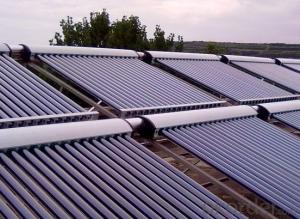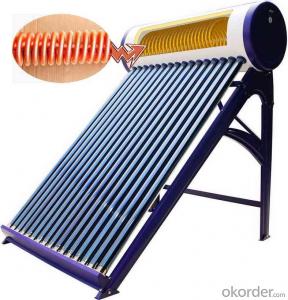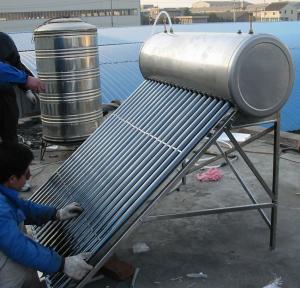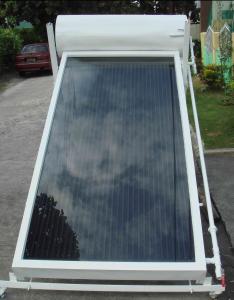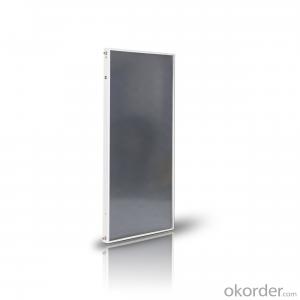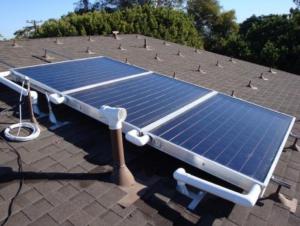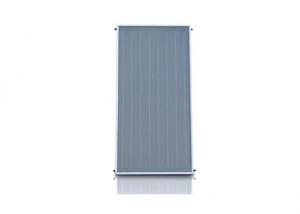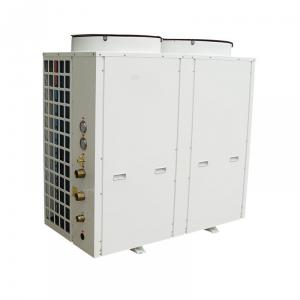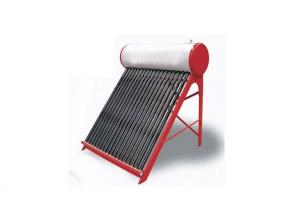Horse Solar Water Heater - High Quality Vacuum Tube Solar Collector China Supplier
- Loading Port:
- China main port
- Payment Terms:
- TT OR LC
- Min Order Qty:
- 10 set
- Supply Capability:
- 10000 set/month
OKorder Service Pledge
OKorder Financial Service
You Might Also Like
Introduction of Non-Pressure Solar Water Heater:
Non-pressure Solar Heater is one of the most economical solar water heating device with pretty high efficiency at the same time. It consists of hot water storage tank, solar vacuum tubes with mouth plug in storage tank, and bracket supporting tank and tubes.When cold water in evacuated tubes is heated with solar irradiation, as the specific gravities of hot water and cold water are different, hotter water goes upward to storage tank and colder water goes downward to glass tubes. through this continuous circulation, the cold water in storage tank will be gradually heated till sunset.
Solar water heaters working principle
1. The solar collector absorbs solar energy and transmits it to the solar water heater tank through circulation
2. When the temperature of the collector reaches the set value, the controller starts the circulation pump automatically
3. The circulation pump makes heat-conducting liquid circulate automatically
4. The heat-conducting liquid transfers heat to water by lower heat exchanger in the water tank.
5. When the temperature difference between solar collector and heat pipe solar water heaters tank doesn't reach the set value, the circulation pump will be shut automatically
6. In case the temperature of the water tank does not reach Tmax, Electric Heating Element will start to work automatically
Solar water heaters working station component:
1. Operating screen
2. Manometer
3. Pump speed adjust switches
4. Temperature difference circulation pump
5. Flow rate indicator
6. Return circuit connector
7. Safety valve
8. Expansion vessel connector9. Return circuit connector
10. Wall mounting
11. Expansion vessel:8L
12. Pressure resistance: 10 bar pressure for expansion vessel
Solar water heaters specification:
Description | solar water heaters |
Material of out manifold | 0.55mm thickness color steel/ fluorine carbon steel |
Material of inner tank | Food grade 2.0 mm thickness SUS304 stainless steel |
Tank insulating layer | 40mm 45kg/m³ high-density polyurethane foamed |
Inlet and outlet hole | Male G1'' |
Max pressure | 0.6 Mpa |
Solar collector tube | 3.3 Borosilicate glass with N/Al coating |
Thickness of glass tube | 1.6mm |
Vacuum tube tightness | P≤0.005 Pa |
Absorption | as=0.93-0.96 (AM1.5) |
Emission ratio | εh=0.04-0.06 (80C±5C) |
Idle sunning property parameters | Y=220~260m2.C/KW |
Average heat loss coefficient | ULT=0.6~0.7W/(m2.C) |
Bracket: | 2.0mm thickness aluminum alloy |
Tank weight | 75KGS |
Tank size | 560mm Dia x 1810mm Height |
Tank capacity | 300L |
Solar collector | 2pcs 58x1800x15tube solar collector |
Absorber area | 2.811 m² |
Working station | SP116 working station |
Heat exchanger length | Upper:12m, Underside:18m |
Solar water heaters details show:
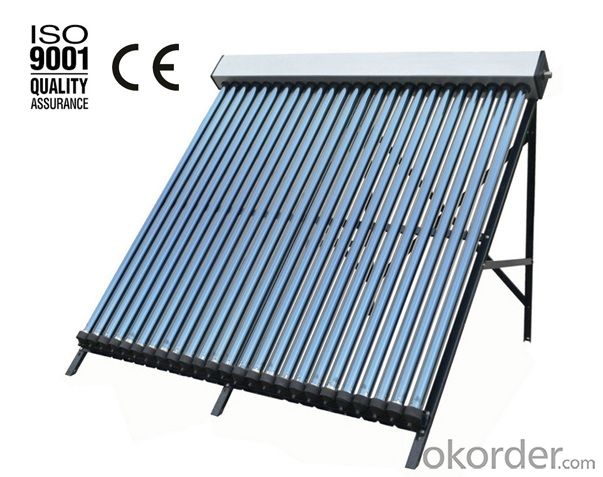
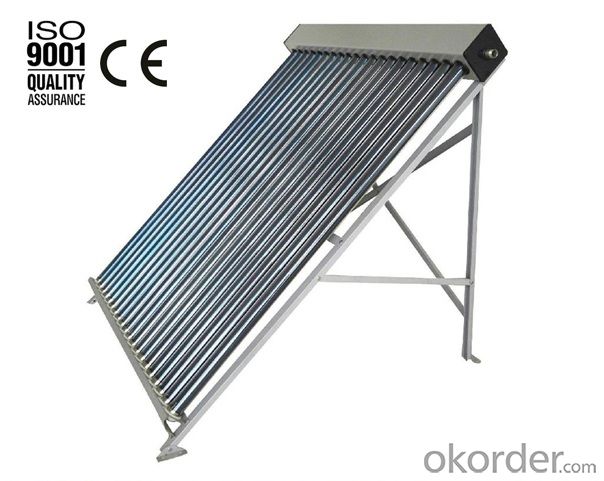
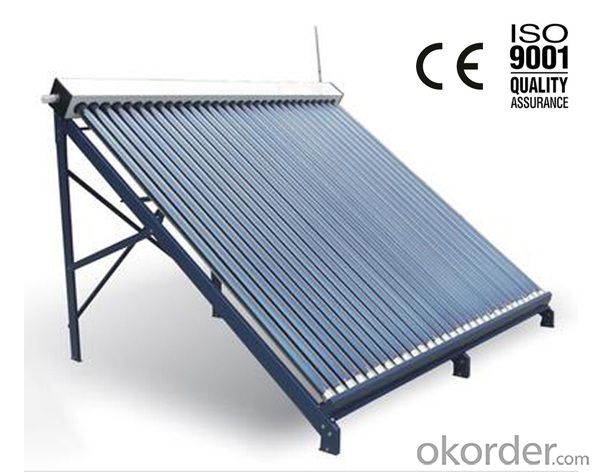
Benefits of this kind of solar water heaters:
1. Prolong the life of your existing water heater
2.Costs less than an electric, gas or oil water heater
3.No maintenance required
4.Lasts longer than a traditional hot water heater
5.Reduce your water heating costs
- Q: What is the impact of snow or ice on the performance of a solar water heater?
- The performance of a solar water heater can be greatly affected by snow or ice. When the surface of the solar panels is covered by snow or ice, sunlight cannot reach the panels, resulting in a decrease in their ability to convert solar energy into heat. This leads to a decrease in the overall efficiency and performance of the solar water heater. Additionally, snow or ice can block the flow of water through the system. If the water in the pipes or heat exchange fluid freezes, it can cause damage to the system or even shut it down completely. This can result in a loss of hot water supply and reduced functionality of the solar water heater during winter months. To minimize the impact of snow or ice on solar water heaters, several measures can be taken. One commonly used method is to install the solar panels at an angle or tilt, allowing snow or ice to slide off more easily. Moreover, installing a heating element or anti-freeze solution in the pipes or heat exchange fluid can prevent freezing and maintain the system's functionality. Regular maintenance and cleaning of the solar panels are also crucial to ensure optimal performance. Removing snow or ice buildup from the panels and ensuring proper insulation and protection against freezing temperatures are essential steps to minimize the impact of winter weather on the performance of a solar water heater. In summary, snow or ice can significantly reduce the efficiency and performance of a solar water heater. By taking preventive measures such as proper installation, insulation, and regular maintenance, the impact can be minimized, and the system can operate effectively year-round.
- Q: LZ solar water heater for several years, dawn, before using normal. A week before the start occasionally "drop" sound twice, that is the water level controller on the control will suddenly jumped into the water from full of water, with water ring twice again. Last weekend, the weekend is not at home, go home and found that he did not know when to start Sheung Shui, turn off the water after the water show, a few minutes to find out the water ran out of hot water. Immediately Sheung Shui, and now occasionally show that the normal water level, usually only show water, can not see the water situation. Asked the manufacturers that the controller and sensor is broken, the replacement to 380...... When LZ bought it, it was more than 1 thousand.Would like to ask what is the problem, 380 of the price is reasonable, the water heater sometimes secretly water, will cause waste, how should we deal with?
- Third, look at the water level probe, is not the above deconstruction, to get rid of the scale, generally able to return to normal.Fourth, look at the pipeline, is not blocked by the scale.Out of the above four problems, it will be normal.
- Q: What is the expected lifespan of the check valve in a solar water heater system?
- The expected lifespan of a check valve in a solar water heater system can vary depending on factors such as the quality of the valve, its usage frequency, and the water conditions. However, on average, a well-maintained check valve in a solar water heater system can last anywhere from 5 to 15 years.
- Q: What is the impact of dust or debris on the performance of a solar water heater?
- The performance of a solar water heater can be significantly impacted by the presence of dust or debris. Dust and debris can accumulate on the surface of the solar panels, causing sunlight to be blocked and reducing the efficiency of the system. This can lead to lower water temperatures and longer heating times. When the solar panels are covered with dust or debris, they create a barrier that prevents sunlight from reaching the solar cells. Solar panels rely on sunlight to convert it into energy, which is then used to heat the water. If the panels are covered, the amount of sunlight reaching the cells decreases, resulting in a decrease in the system's efficiency. Furthermore, dust and debris can also hinder the heat transfer process within the solar water heater. When the surface of the solar panels is covered, the transfer of heat between the solar energy and the water is impeded. As a result, the water takes longer to heat up, compromising the overall performance of the solar water heater. To ensure the optimal performance of the solar water heater, regular maintenance, such as cleaning the solar panels, is essential. By removing dust and debris, the system can operate at its maximum efficiency, effectively providing hot water.
- Q: What is the required maintenance frequency for a solar water heater?
- The required maintenance frequency for a solar water heater typically depends on its specific make and model, as well as the local climate and water quality. However, in general, it is recommended to have a professional inspection and maintenance check at least once a year to ensure optimal performance and longevity of the system. Regular cleaning of panels, checking for leaks, verifying proper fluid levels, and testing the overall functionality are some of the key maintenance tasks that should be performed regularly.
- Q: Can a solar water heater be used in areas with high wind speeds?
- Yes, a solar water heater can be used in areas with high wind speeds. However, it is important to ensure that the system is properly designed and installed to withstand these conditions. Wind-resistant mounting systems, sturdy materials, and proper anchoring can help to secure the solar water heater and prevent any damage or loss due to high wind speeds.
- Q: How does the design of solar panels affect the performance of a solar water heater?
- The design of solar panels plays a crucial role in determining the performance of a solar water heater. The efficiency and effectiveness of the panels in capturing and converting sunlight into usable energy directly impact the heating capabilities of the system. Factors such as the type of solar panel, its size, orientation, and tilt angle all influence the amount of sunlight absorbed and the thermal energy transferred to the water. Therefore, a well-designed solar panel system can significantly enhance the performance and overall efficiency of a solar water heater.
- Q: How does the aesthetic appeal of a solar water heater compare to a traditional water heating system?
- The aesthetic appeal of a solar water heater is generally considered to be more favorable compared to a traditional water heating system. Solar water heaters often have a sleek and modern design that can blend well with the overall aesthetics of a building. On the other hand, traditional water heating systems, such as gas or electric water heaters, usually have a bulkier and less visually appealing appearance. The use of solar panels in a solar water heater can also give a sense of sustainability and eco-friendliness, which further enhances its aesthetic appeal.
- Q: Are there any health benefits associated with using a solar water heater?
- There are multiple health benefits associated with the use of solar water heaters. One of the main advantages is the decrease in exposure to harmful chemicals and toxins that are present in traditional water heating systems. Unlike traditional methods that rely on fossil fuels like natural gas or oil, solar water heaters utilize clean and renewable solar energy. This eliminates the release of harmful emissions during the heating process, resulting in improved indoor air quality and a reduced risk of respiratory problems. Furthermore, solar water heaters help prevent the growth of harmful bacteria and microorganisms in the water supply. Unlike traditional heaters that store hot water in tanks, which can create an environment suitable for the growth of Legionella bacteria and other pathogens, solar water heaters heat water on-demand. This minimizes the risk of bacterial contamination and decreases the chances of waterborne diseases. Additionally, the use of solar water heaters can positively impact skin health. Traditional water heating systems often rely on hard water, which contains high levels of minerals like calcium and magnesium. These minerals can dry out the skin and hair, leading to issues such as dryness, itchiness, and dandruff. However, solar water heaters can be equipped with water softening systems that remove these minerals. This results in softer and healthier skin and hair. Finally, the use of solar water heaters can contribute to overall mental and emotional well-being. By reducing reliance on non-renewable energy sources, individuals can feel a sense of satisfaction and pride in their contribution to a healthier and more sustainable environment. This positive mindset can have a cascading effect on mental health, improving mood, reducing stress, and promoting overall well-being. In conclusion, solar water heaters offer various health benefits, including reduced exposure to harmful chemicals, prevention of bacterial contamination, improved skin health, and positive impacts on mental well-being. By harnessing the power of the sun, solar water heaters provide a sustainable and health-conscious solution for water heating.
- Q: What are the different types of solar water heaters?
- There are two main types of solar water heaters: active and passive systems. Active systems use pumps or fans to circulate water or heat transfer fluids, while passive systems rely on natural convection to circulate water. Within these categories, there are further variations such as flat-plate collectors, evacuated tube collectors, and batch systems.
Send your message to us
Horse Solar Water Heater - High Quality Vacuum Tube Solar Collector China Supplier
- Loading Port:
- China main port
- Payment Terms:
- TT OR LC
- Min Order Qty:
- 10 set
- Supply Capability:
- 10000 set/month
OKorder Service Pledge
OKorder Financial Service
Similar products
Hot products
Hot Searches
Related keywords
